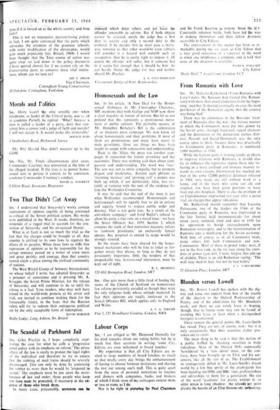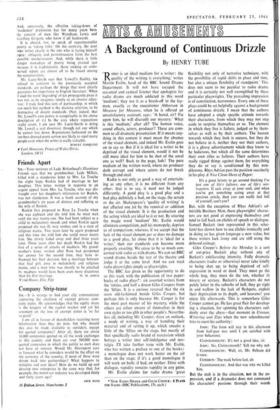Blunden versus Lowell SIR,--Mr. Robert Lowell has spoken with the
dig- nity and sense one expects from him of the results of the election to the Oxford Professorship of Poetry, and of his admiration for Mr. Blunden's work; and there we can surely leave it—hoping, though, that in future some way can be found of avoiding this farce, at least when a distinguished foreigner is concerned.
There remain the general points Mr. Lucie-Smith has raised. They are not, of course, new: but it is only occasionally that their ceaseless clatter pro- vokes one to retort.
The main thing to be said is that this notion of a public baffled by shocking novelties is truly ridiculous. Most of the Oxford MAs supposedly 'bewildered' by a 'new idiom' must, on the con- trary, have been brought up on Eliot and his suc- cessors, like all the rest of us. The Establishment so courageously defied in Mr. Lucie-Smith's dream world by a few fine spirits of the avant-garde has been handing out OMs and BBC time, professorships and editorships to them for a generation. His use of the word 'academic' for poetry written in an older strain is long obsolete: the schools are quite plainly the haunts of an Eliot-Stevens-etc. orthodoxy.
And, conversely, the effective taking-down of 'modernist' pretension has for many years been the concern of men like Wyndham Lewis and Geoffrey Grigson, who knew it all backwards.
It is absurd, too, to speak of experimentalist poetry as 'taking risks.' On the contrary, the poet who writes clearly is the one who is laying himself open : obliquity and portentousness form the best possible smoke-screens. And, while there is little danger nowadays of poetry being praised just because it is traditionalist, those seeking an unde- served repute are almost all to be found among the sensationalists.
Mr. Lucie-Smith says that 'Lowell's fluidity, his refusal to conform to the previously accepted standards, are perhaps the things that most clearly guarantee his importance to English literature.' When I used the word 'degrading' of his propaganda piece it was not, as he imagines, simply as an abusive adjec- tive: I truly find this sort of partisanship, in which not merit but method is the decisive criterion, to be destructive of decent standards. (Not, indeed, that Mr. Lowell's own poetry is recognisable in the above description of it.) In the area where reputations really count, I am sure Mr. Lucie-Smith is doing Mr. Lowell a real disservice, though not one which he cannot live down. Reputations fashioned on the ten-best-dressed-poets system are likely to repel many people even when the writer is really valuable.
ROBERT CONQUEST
4 York Mansions, Prince of Wales Drive, London, SW 1I



































 Previous page
Previous page